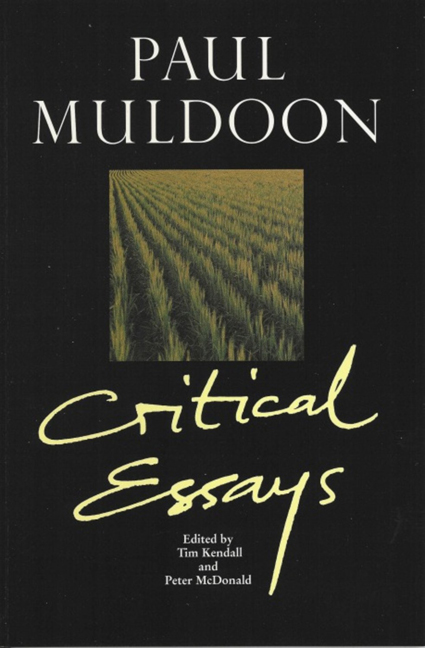Book contents
- Frontmatter
- Contents
- Acknowledgements
- Notes on Contributors
- Introduction
- ‘Thirteen or Fourteen’: Paul Muldoon's Poetics of Adolescence
- Never Quite Showing his Hand: Robert Frost and Paul Muldoon
- For Father Read Mother: Muldoon's Antecedents
- Pax Hibernica/Pax Americana: Rhyme and Reconciliation in Muldoon
- Muldoon and Pragmatism
- ‘All That’: Muldoon and the Vanity of Interpretation
- Paul Muldoon's Transits: Muddling Through after Madoc
- ‘All Art is a Collaboration’: Paul Muldoon as Librettist
- Muldoon's Remains
- Index
Pax Hibernica/Pax Americana: Rhyme and Reconciliation in Muldoon
- Frontmatter
- Contents
- Acknowledgements
- Notes on Contributors
- Introduction
- ‘Thirteen or Fourteen’: Paul Muldoon's Poetics of Adolescence
- Never Quite Showing his Hand: Robert Frost and Paul Muldoon
- For Father Read Mother: Muldoon's Antecedents
- Pax Hibernica/Pax Americana: Rhyme and Reconciliation in Muldoon
- Muldoon and Pragmatism
- ‘All That’: Muldoon and the Vanity of Interpretation
- Paul Muldoon's Transits: Muddling Through after Madoc
- ‘All Art is a Collaboration’: Paul Muldoon as Librettist
- Muldoon's Remains
- Index
Summary
I think that the writer should be alert to all these possible readings. And alert to the curtailing of possible readings that are not productive. And I don't care what people say, it's the writer who does that. And the points at which he doesn't do it are the points at which there is confusion […]. Because that's what the process of writing is about. It's about opening himself, or herself to the floodgates, what it's about is discovering the extent of limits, the confinement, the controlling of readings, of possible readings.
Muldoon is not talking here just about meaning, but about the whole creative process. His words register the distinction between what Kristeva calls the symbolic or thetic aspects of poetic language (‘discovering the extent of limits, the confinement, the controlling of readings’) and their semiotic source, the poet ‘opening himself, or herself to the floodgates’. The latter point, Kristeva implies, is where rhyme comes in: ‘this experience of the semiotic chora in language produces poetry. It can be considered as the source of all stylistic effort, the modifying of banal, logical order by linguistic distortions such as metaphor, metonymy, musicality’.
Rhyme is certainly part of poetry's ‘musicality’. But music itself involves intellectual awareness and command as well as semiotic energies:
There are non-verbal signifying systems that are constructed exclusively on the basis of the semiotic (music, for example). But, as we shall see, this exclusivity is relative, precisely because of the necessary dialectic between the two modalities of the signifying process, which is constitutive of the subject. Because the subject is always both semiotic and symbolic, no signifying system he produces can be either ‘exclusively’ semiotic or ‘exclusively’ symbolic, and is instead necessarily marked by an indebtedness to both.
Poetry's musical dimension is inseparable from its discursive potential: ‘No text, no matter how “musicalized”, is devoid of meaning or signification; on the contrary, musicalization pluralizes meanings’. W.K. Wimsatt points out that the musical element of poetry in isolation ‘has little if any aesthetic value’, while the varied degrees and kinds of meaning carried by the rhyme words are crucial: ‘verse in general, and more particularly rhyme, make their special contribution to poetic structure in virtue of a studiously and accurately semantic character. They impose upon the logical pattern of expressed argument a kind of fixative counterpattern of alogical implication.’
- Type
- Chapter
- Information
- Paul MuldoonCritical Essays, pp. 62 - 95Publisher: Liverpool University PressPrint publication year: 2004



